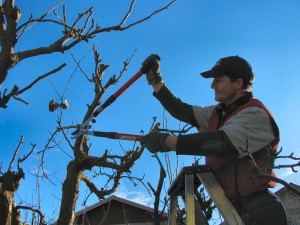
Last week, I began reading the new book from IVP publisher Bob Fryling, The Leadership Ellipse: Shaping How We Lead By Who We Are. I’ve been thinking quite a bit about the question “Who am I?” (and reading other IVP books on the subject of being yourself). Bob seeks to connect two popular genres that don’t often interact with one another: spiritual formation books that focus on the contemplative, internal life, and leadership books that focus on the active, external life. In truth, our internal and external lives cannot be separated —in the foreword, Eugene Peterson calls them the “right foot and left foot of our Christian life” —but they are rarely brought together in an explicit way.
Photo credit: pictoscribe via Flickr
Chapter two —”A Growing Strength: The Practice of Pruning” —contained some advice that I found challenging, which I bet many of you will also find challenging. Bob writes that, for spiritual and personal growth, we often need pruning, especially three kinds:
- Pruning of reputation and self-righteousness
- Pruning of the passion to maximize life
- Pruning of soliciting praise
Much could be said of all three, but I found the middle pruning —of the passion to maximize life —the most challenging. Bob recognizes that we must be responsible stewards of the talents that God has given us, and that we must work for “night is coming” (John 9:4), yet there is danger in pursuing efficiency, just as there is danger in too much food or drink.
As leaders we can also become addicted to efficiencies that at first help our bottom line or our workload, but can become an obsession that leaves out important relationships’
Choosing not to be consumed with efficiency is a great freedom that allows greater flexibility and spontaneity. As Jesus taught, it is not efficient to go after the one lost sheep at the expense of the other ninety-nine, but it is the right choice.
Personally, I struggle with a desire for “efficient mornings,” which usually means that I try to read the newspaper while getting my children ready for the day, and then skip directly to my email, calendar, and task list instead of taking time for Bible study and prayer. Of course, the results are that my children try to model my efficiency by wanting to watch TV while they eat their breakfast, and that I quickly fall out of the discipline of spending time with God.
How do you respond to Bob’s statement about efficiency? Do you struggle with making efficiency an idol at the expense of relationships or other important areas of life? How do you guard against the idolatry of efficiency?
If you want to order The Leadership Ellipse, don’t forget about your ESN member discount! Also, see a Google Preview of the book after the break.
The former Associate Director for the Emerging Scholars Network, Micheal lives in Cincinnati with his wife and three children and works as a web manager for a national storage and organization company. He writes about work, vocation, and finding meaning in what you do at No Small Actors.

Leave a Reply